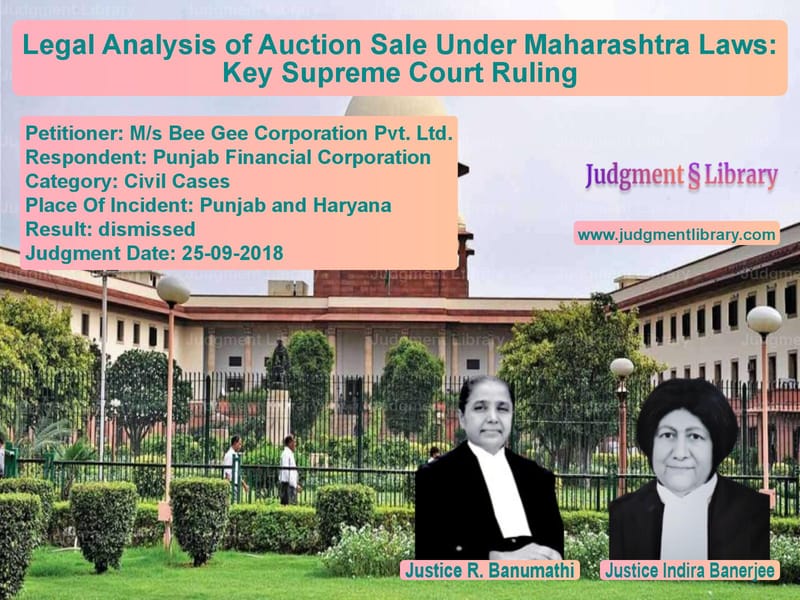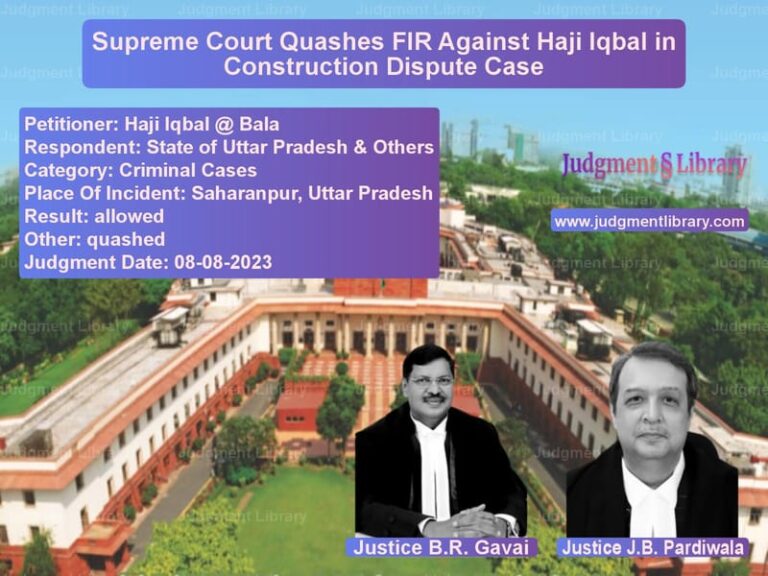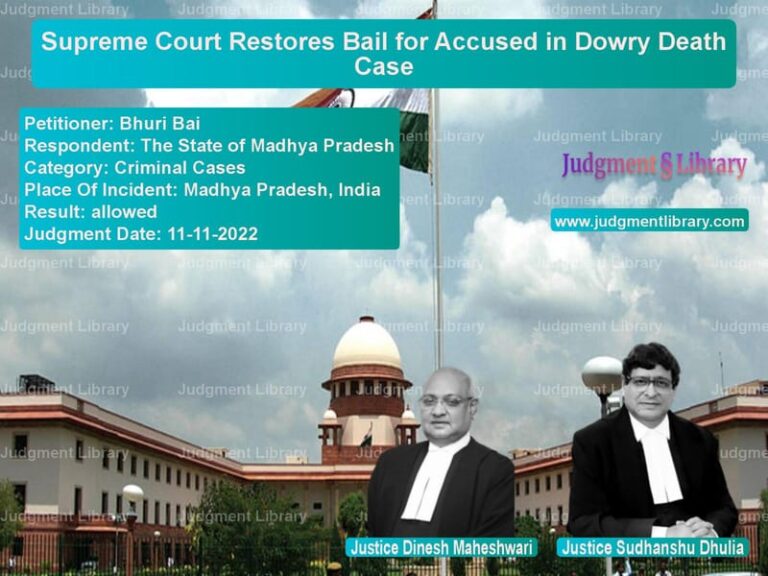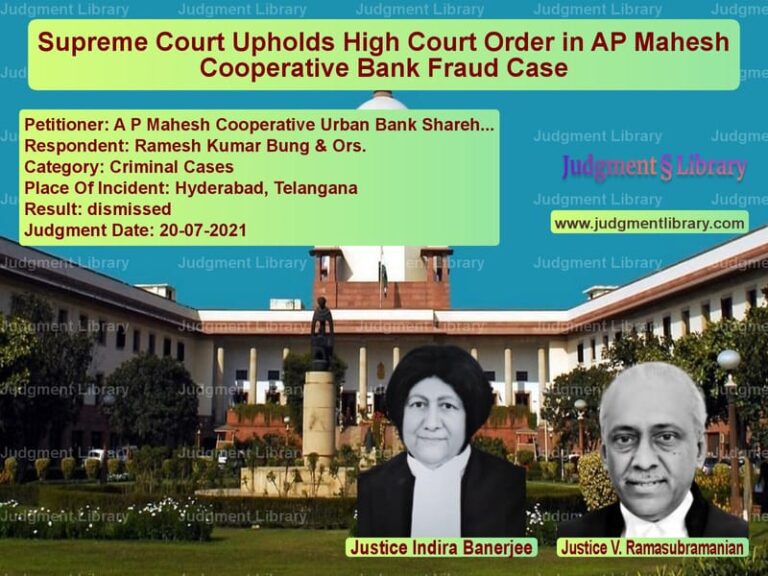Legal Analysis of Auction Sale Under Maharashtra Laws: Key Supreme Court Ruling
The case of M/s Bee Gee Corporation Pvt. Ltd. vs. Punjab Financial Corporation & Anr. involves a dispute regarding the validity of a court auction sale. The petitioners, M/s Bee Gee Corporation, challenged the decision of the High Court which upheld the auction sale conducted by the Executing Court in favor of Punjab Financial Corporation. The case centers on the applicability of Order 21 Rule 85 of the Civil Procedure Code (CPC) and the failure to publish the sale notice well in advance. The Supreme Court was tasked with addressing these concerns and determining the legality of the auction sale.
Background of the Case
The appellant, M/s Bee Gee Corporation, had secured a loan from Punjab Financial Corporation (PFC) in 1966 but defaulted on repayment, leading the respondent to file for execution of the loan decree. The sale of the appellant’s property took place on December 16, 1983, under the order of the Executing Court. The appellant contended that the auction sale was not conducted in compliance with the mandatory provisions of Order 21 Rule 85 CPC, which necessitates prior publication of the sale notice and the deposit of a specified percentage of the bid amount.
Furthermore, the appellant argued that the publication of the sale notification on December 15, 1983, was inadequate, and that the court auction should be set aside due to these irregularities.
Petitioner’s Arguments (Appellant)
- The appellant argued that the sale was vitiated due to non-compliance with mandatory provisions of Order 21 Rule 85 CPC, particularly the lack of proper notice prior to the auction.
- The appellant contended that the Executing Court’s failure to ensure that the sale was conducted in accordance with the rules violated their right to a fair procedure.
- The appellant emphasized that the PFC, as both a decree holder and auction purchaser, did not comply with the requirements for public sale, which included the deposit of 25% of the bid amount at the time of the auction.
- The non-publication of the sale notice prior to December 15, 1983, was highlighted as a key issue. The appellant argued that this caused prejudice to other potential bidders, as the sale was not adequately publicized.
Respondent’s Arguments (PFC)
- The respondent, PFC, argued that the auction sale had been conducted with due compliance of the provisions of the CPC, including the proper issuance of notices and the affixing of the sale warrant at the property.
- They stated that the application for exemption from depositing the bid amount was approved by the Executing Court on December 3, 1983, and no objections were raised against it.
- The respondent further argued that the appellant had failed to provide any evidence that the auction was not advertised properly, pointing to the published notices in the ‘Daily Tribune’ and other papers.
- Additionally, the respondent maintained that the appellant’s claims regarding the failure to advertise the sale notice were unfounded, as the notice had been affixed in a timely manner at the site, and the publication was done as required under the CPC.
Supreme Court’s Observations
The Supreme Court examined the legal arguments raised by both parties, considering the provisions of the CPC in detail. The Court made several crucial observations regarding the legality of the auction sale:
- On Compliance with Order 21 Rule 85 CPC: The Court observed that while Order 21 Rule 85 CPC mandates that a sale notice be given in advance, the provision also allows the decree holder, if they are the auction purchaser, to set off the decree amount against the bid. The Court found that PFC, as both the decree holder and auction purchaser, was entitled to such a provision under the rules, and therefore, the sale was not invalidated on this ground.
- On the Requirement of the Deposit of the Bid Amount: The Court noted that under Order 21 Rule 72 and Rule 85, the deposit of the bid amount is not necessary in cases where the decree holder is the auction purchaser and the amount can be adjusted against the decree.
- On the Publication of Sale Notice: The Court examined the appellant’s argument that the sale notice was not properly published. The Court referred to the evidence presented by the respondent, which included the affidavit of K.R. Bhalla (DW-1), confirming the public announcement of the sale in the ‘Daily Tribune’ and other papers. The Court found this sufficient to satisfy the publication requirement.
- On the Timeliness of the Auction: The Court considered that despite the sale notice being published a day before the auction, the Court found no substantial harm to the appellant or other bidders as the sale was widely publicized and no objections were raised during the process.
Key Judgment Excerpts
The Supreme Court ruled:
“The auction sale conducted on December 16, 1983, was valid and in accordance with the provisions of the Civil Procedure Code. The respondent, as both the decree holder and auction purchaser, was entitled to the exemption from depositing the bid amount.”
On the issue of publication of the sale notice, the Court noted:
“The notice was affixed on the property in question and also published in widely circulated newspapers. The failure to publish the notice earlier was not a significant violation, as there was no prejudice to the appellant or any other potential bidders.”
Final Judgment
- The Supreme Court dismissed the appeal and upheld the auction sale conducted on December 16, 1983.
- The Court ruled that there was no violation of the provisions of the Civil Procedure Code in the conduct of the auction, including the publication of the sale notice and the deposit of the bid amount.
- The appellant’s challenge to the sale was rejected, and the High Court’s judgment was affirmed.
Conclusion
This case highlights the importance of adhering to the provisions under the Civil Procedure Code regarding auction sales and the specific rules that apply when the decree holder is also the purchaser. The Supreme Court’s decision reinforces that procedural lapses, such as the timing of the publication of sale notices, will not automatically invalidate an auction sale if the process was conducted transparently and without harm to the parties involved. This ruling ensures that auction sales conducted in compliance with the law are protected, providing clarity on the legal aspects of sale notices and bid deposits in property auction cases.
Petitioner Name: M/s Bee Gee Corporation Pvt. Ltd..Respondent Name: Punjab Financial Corporation.Judgment By: Justice R. Banumathi, Justice Indira Banerjee.Place Of Incident: Punjab and Haryana.Judgment Date: 25-09-2018.
Don’t miss out on the full details! Download the complete judgment in PDF format below and gain valuable insights instantly!
Download Judgment: Ms Bee Gee Corporat vs Punjab Financial Cor Supreme Court of India Judgment Dated 25-09-2018.pdf
Direct Downlaod Judgment: Direct downlaod this Judgment
See all petitions in Contract Disputes
See all petitions in Property Disputes
See all petitions in Specific Performance
See all petitions in Judgment by R. Banumathi
See all petitions in Judgment by Indira Banerjee
See all petitions in dismissed
See all petitions in supreme court of India judgments September 2018
See all petitions in 2018 judgments
See all posts in Civil Cases Category
See all allowed petitions in Civil Cases Category
See all Dismissed petitions in Civil Cases Category
See all partially allowed petitions in Civil Cases Category







